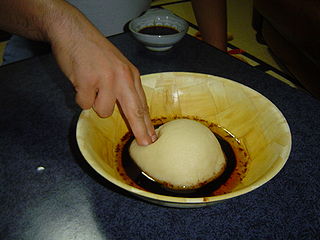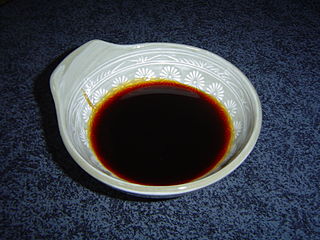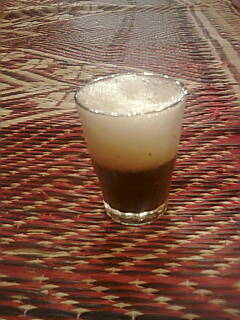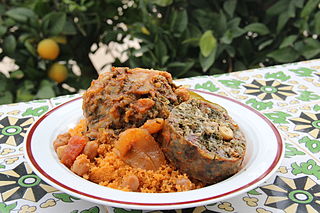 W
WLibyan cuisine derives much from the traditions of Mediterranean, North African, and Berber cuisines. One of the most popular Libyan dishes is bazin, an unleavened bread prepared with barley, water and salt. Bazin is prepared by boiling barley flour in water and then beating it to create a dough using a magraf, which is a unique stick designed for this purpose. Pork consumption is forbidden, in accordance with Sharia, the religious laws of Islam.
 W
WAsida is a dish with origins from medieval al-Andalus, made of a cooked wheat flour lump of dough, sometimes with added butter or honey. Similar in texture to gruel, it is eaten in many North African and Middle Eastern countries. It is considered one of the most popular desserts and traditional dishes in many Arab countries. Asida is particularly popular in Yemen, Sudan, Saudi Arabia, Kuwait, Algeria, Libya, Somalia, Tunisia, Ethiopia, Eritrea, and Indonesia. As most traditional foods of these countries, it is usually eaten by hand, without the use of utensils. Often served during religious holidays such as Mawlid and Eid, it is also served during other traditional ceremonies, for example accompanying the birth of child, such as the ‘aqīqah, the cutting of the hair of a newborn seven days after birth.
 W
WBazin (Arabic: البازين, pronounced [baːˈziːn], is an unleavened bread in the cuisine of Libya prepared with barley, water and salt. Bazin is prepared by boiling barley flour in water and then beating it to create a dough using a magraf, which is a unique stick designed for this purpose. The dough may then be placed in a pan and allowed time to harden, after which it is baked or steamed. The salt contributes to the hardness of the bazin. Bazin may have a paste-like and hardened texture. It may also be prepared using whole wheat flour, olive oil and pepper as ingredients.
 W
WBsisa is a typical North African food, based on flour of roasted barley which dates back to Roman times.
 W
WChraime is a spicy fish stew with tomatoes from the Libya. The name of the dish comes from the Arabic word for "hot".
 W
WCouscous is a Berber dish of small steamed balls of crushed durum wheat semolina that is traditionally served with a stew spooned on top. Pearl millet and sorghum, especially in the Sahel, and other cereals can be cooked in a similar way and the resulting dishes are also sometimes called couscous. Pearl or Israeli couscous, properly known as ptitim, is a type of pasta.
 W
WDate honey, date syrup, date molasses or rub is a thick dark brown, very sweet fruit syrup extracted from dates. It is widely used in North African and Middle Eastern cooking.
 W
WHarissa is a Tunisian hot chili pepper paste, the main ingredients of which are roasted red peppers, Baklouti peppers (بقلوطي), spices and herbs such as garlic paste, caraway seeds, coriander seeds, cumin and olive oil to carry the oil-soluble flavors. Rose harissa, made with rose petals, is also made.
 W
WJalebi, also known as Jilapi, zulbia, mushabak and zalabia, is an Indian sweet snack popular all over South and Western Asia. It is made by deep-frying maida flour batter in pretzel or circular shapes, which are then soaked in sugar syrup.
 W
WLibyan tea is a strong beverage, prepared with traditional set of stainless utensils and served in a small glass cups. It is similar to Moroccan tea in prepared by boiling loose tea leaves but differ in presentation. Libyan tea is usually served in three courses with the last round including boiled skinless peanuts or almonds. Mint or basil are sometimes added as a flavor. Initially sugarless beverage is prepared to allow for a foam formation. Each cup when finally presented would have a layer of yellowish foam on top of the tea.
 W
WMakroudh is a cookie from the cuisines of the Maghreb and Malta. It is filled with dates and nuts or almond paste, that has a diamond shape – the name derives from this characteristic shape.
 W
WOrgeat syrup is a sweet syrup made from almonds, sugar, and rose water or orange flower water. It was originally made with a barley-almond blend. It has a pronounced almond taste and is used to flavor many cocktails. Orgeat syrup is an important ingredient in the Mai Tai and many Tiki drinks.
 W
WSemolina is the coarse, purified wheat middlings of durum wheat mainly used in making couscous, pasta, upma, and sweet puddings. The term semolina is also used to designate coarse middlings from other varieties of wheat, and sometimes other grains as well.
 W
WSfinz is a Libyan doughnut. It is prepared with a flour dough fried in oil. Sfinz is eaten sprinkled with sugar or soaked in honey or date molasses. It can be eaten for Friday breakfast or for afternoon tea. Though it is eaten year-round, it is especially popular during the winter months and around Ramadan and Eid al-Fitr. It is the Libyan version of the sfenj doughnuts that are widely popular across the other countries of the Maghreb.
 W
WShakshouka is a Maghrebi dish of eggs poached in a sauce of tomatoes, olive oil, peppers, onion and garlic, and commonly spiced with cumin, paprika, cayenne pepper, and nutmeg. Egg shakshouka evolved from an Ottoman meat stew, also called shakshouka, into a vegetarian egg-based dish.
 W
WTaguella is a flat bread, the staple dish of Tuareg people living in the Sahara. It is a disk-shaped bread made from wheat flour and cooked buried underneath the hot sand and charcoal of a small fire. The bread is then broken up into small pieces and eaten with a meat sauce.
 W
WUsban is a traditional kind of sausage in Tunisia, Algeria, and Libya, stuffed with a mixture of rice, herbs, lamb, chopped liver and heart. This dish is usually served alongside the main meal of rice or couscous, often on special occasions.